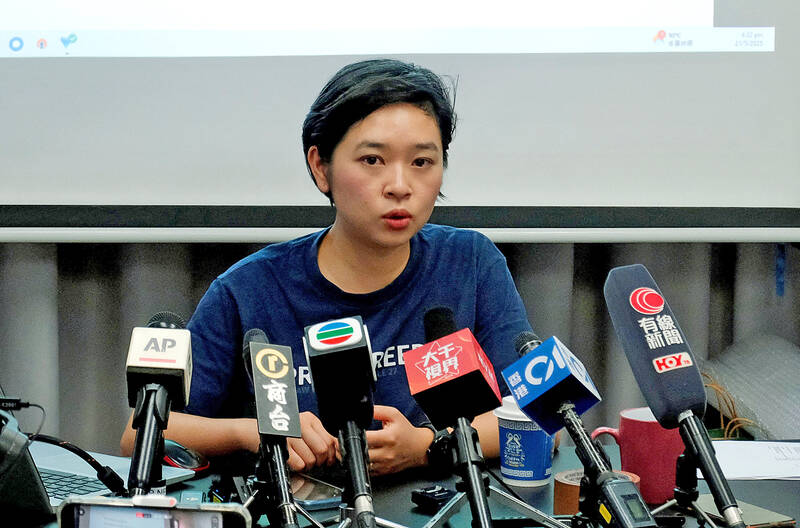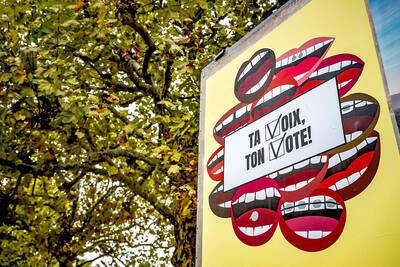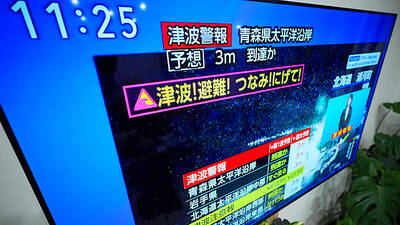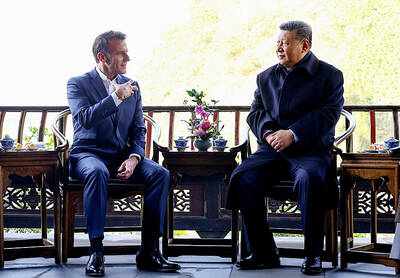At least five local media outlets in Hong Kong and multiple journalists had their taxes from years ago audited on “unreasonable grounds,” a press association said on Wednesday.
Hong Kong’s press freedom ranking has plummeted since Beijing cracked down on dissent after huge, sometimes violent democracy protests in 2019.
The Hong Kong tax authorities alleged that a group of online outlets, reporters and some of their family members had failed to report their income in full from 2017 to 2019.

Photo: AFP
Backdated demands have been issued as a result, the Hong Kong Journalists Association (HKJA) said.
The association told reporters it believed the audits “were not based on sufficient evidence or reasonable grounds.”
The affected media outlets include Hong Kong Free Press, Inmedia and The Witness, a news site focused on covering court cases, as well as two others.
The tax department had claimed back money for “bizarre” reasons, including calculating nonexistent income from before one of the outlets was founded, HKJA said.
Selina Cheng (鄭嘉如), the association’s chair and a former Wall Street Journal reporter, said the association, herself and her parents were also affected.
“It does have a negative effect on Hong Kong’s press freedom,” Cheng told a news conference. “Press freedom not only means the ability for media and journalists to operate safely, physically... It also means the business environment, whether it is sustainable for them to operate.”
The Hong Kong Inland Revenue Department said it followed the legal process and that its actions were not aimed at specific industries, local media reported.
The department added that it would not comment on “individual cases.”
Hong Kong journalists rated the territory’s press freedom lower than ever in an annual survey last year, citing fears around sweeping national security laws.
More than 90 percent of journalists surveyed said the territory’s press freedom was “significantly” impacted by a domestic security law enacted in March last year that punishes crimes such as espionage and foreign interference.
Colloquially known as Article 23, it was the second such law enacted for the financial hub, following Hong Kong’s National Security Law, imposed by Beijing in 2020 after the democracy protests.
The Chinese Ministry of Foreign Affairs said that Hong Kong’s security laws “target a very small number of individuals who severely endanger national security, not law-abiding media reporters.”
Additional reporting by AP

A plan by Switzerland’s right-wing People’s Party to cap the population at 10 million has the backing of almost half the country, according to a poll before an expected vote next year. The party, which has long campaigned against immigration, argues that too-fast population growth is overwhelming housing, transport and public services. The level of support comes despite the government urging voters to reject it, warning that strict curbs would damage the economy and prosperity, as Swiss companies depend on foreign workers. The poll by newspaper group Tamedia/20 Minuten and released yesterday showed that 48 percent of the population plan to vote

PARLIAMENT CHAOS: Police forcibly removed Brazilian Deputy Glauber Braga after he called the legislation part of a ‘coup offensive’ and occupied the speaker’s chair Brazil’s lower house of Congress early yesterday approved a bill that could slash former Brazilian president Jair Bolsonaro’s prison sentence for plotting a coup, after efforts by a lawmaker to disrupt the proceedings sparked chaos in parliament. Bolsonaro has been serving a 27-year term since last month after his conviction for a scheme to stop Brazilian President Luiz Inacio Lula da Silva from taking office after the 2022 election. Lawmakers had been discussing a bill that would significantly reduce sentences for several crimes, including attempting a coup d’etat — opening up the prospect that Bolsonaro, 70, could have his sentence cut to

A powerful magnitude 7.6 earthquake shook Japan’s northeast region late on Monday, prompting tsunami warnings and orders for residents to evacuate. A tsunami as high as three metres (10 feet) could hit Japan’s northeastern coast after an earthquake with an estimated magnitude of 7.6 occurred offshore at 11:15 p.m. (1415 GMT), the Japan Meteorological Agency (JMA) said. Tsunami warnings were issued for the prefectures of Hokkaido, Aomori and Iwate, and a tsunami of 40cm had been observed at Aomori’s Mutsu Ogawara and Hokkaido’s Urakawa ports before midnight, JMA said. The epicentre of the quake was 80 km (50 miles) off the coast of

RELAXED: After talks on Ukraine and trade, the French president met with students while his wife visited pandas, after the pair parted ways with their Chinese counterparts French President Emmanuel Macron concluded his fourth state visit to China yesterday in Chengdu, striking a more relaxed note after tough discussions on Ukraine and trade with Chinese President Xi Jinping (習近平) a day earlier. Far from the imposing Great Hall of the People in Beijing where the two leaders held talks, Xi and China’s first lady, Peng Liyuan (彭麗媛), showed Macron and his wife Brigitte around the centuries-old Dujiangyan Dam, a World Heritage Site set against the mountainous landscape of Sichuan Province. Macron was told through an interpreter about the ancient irrigation system, which dates back to the third century